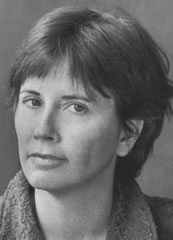
introducing readers to writers since 1995
November 13, 2004
Kate Walbert Is Our Kind of Author
by Ron Hogan I called Kate Walbert a little after 8:00 p.m. Veteran's Day, after she'd put her two children to sleep, and asked if she had seen Caryn James' complaints about the National Book Award shortlist that morning. "It's been brought to my attention," she laughed. "To tell you the truth, I couldn't untangle a lot of that article, but whatever. At this point, it's funny. Theres been this whole trajectory of angles on the five of us, and each one seems to suggest theres something terribly wrong with these choices. This is just another angle... but they're calling attention to the books, and that's good."
I called Kate Walbert a little after 8:00 p.m. Veteran's Day, after she'd put her two children to sleep, and asked if she had seen Caryn James' complaints about the National Book Award shortlist that morning. "It's been brought to my attention," she laughed. "To tell you the truth, I couldn't untangle a lot of that article, but whatever. At this point, it's funny. Theres been this whole trajectory of angles on the five of us, and each one seems to suggest theres something terribly wrong with these choices. This is just another angle... but they're calling attention to the books, and that's good."
"It's hard to step back at this point and be clear about what the nomination has meant or what it's going to mean," Walbert reflected, but she's gratified by one aspect of the new attention brought to Our Kind, her collection of short stories. "It's almost like the book's being republished. There's such a short shelf life for books now, I dont know how long it was out there, maybe a week. And Im a W, too, which adds to the problem. What Id give to be an M or a P," she laughed. The shelf life is even shorter, perhaps, for short story collections, even ones linked thematically, as hers is by its focus on a group of suburban women "of a certain age," as the Times "Metropolitan Diary" might say. She joked about an upcoming reading at the public library in Darien, Connecticut, as an excursion into "Our Kind territory," but insisted "it's not really Connecticut women I picture, although I've been around a lot of them. Its a blend of women I've known and knew as a child, the sort of women who would play bridge with my mother while I eavesdropped on their conversations. I've always been interested in that generation of women; I find them to be so unique--a little too late, a little too early."
The women in the stories are bonded together by Walbert's use of the first person plural voice, a move that took her by surprise when she wrote the first story, "The Intervention," in the mid-'90s. "After I wrote it," she explained, I thought, 'Well, what is this strange little thing?' But every six months or so, regardless of what I was working on, I would sit down and write another of what I called my 'we stories.'" She found the voice like "writing in a straitjacket, but it's the classic scenario for writers: you dig the hole and then try to find your way out." Her tentative plans to move towards a first person singular voice by the end of the cycle never panned out, she added, "and the more I wrote in this voice, I realized you cant get inside anyone's head specifically, so that forces you to learn everything you know about the characters through what they say about themselves, and then ask yourself whether that's believable or not."
Taking the controversy over the shortlist in stride, she passed along her daughter's compliment for getting a sticker on her book and remarked, "Any time would be a tremendous thrill, but I'm so happy to be on this particular list, the first list that's all women, and be able to stand back and watch the reaction. And it gives me four great writers to read." She has become friendly with the other nominees, and though she observes "a sense of circling the wagons," she believes there was more to their camaraderie than that. When they met for the first time, she recalled, "it was just five people who love books. We talked a little bit about the press, a little bit about our Amazon rankings, and then we talked about the books we were reading. I think the bond came out of that more than anything else."
your PayPal donation
can contribute towards its ongoing publication.